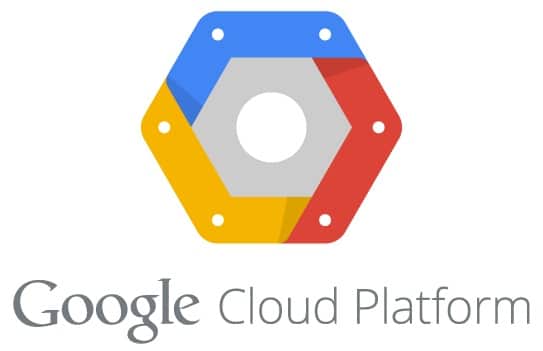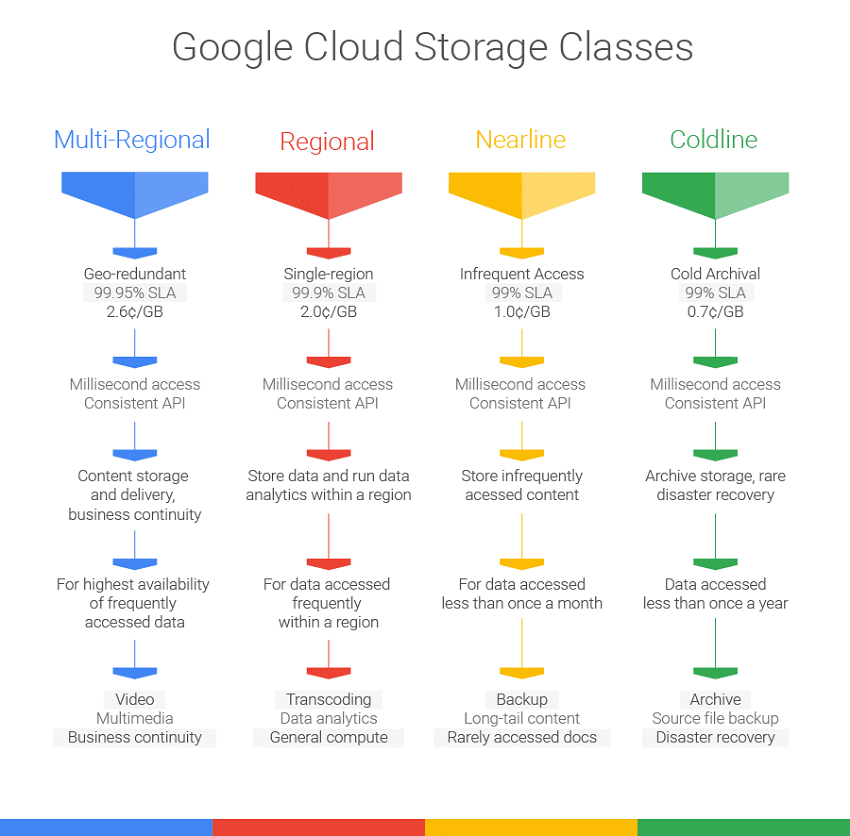Google has announced a significant refresh of Google Cloud Storage, including new storage classes, data lifecycle management tools, improved availability, lower prices and comprehensive storage options to cater to different use cases. Google has also unveiled the further expansion of their Google Cloud Platform (GCP) partner ecosystem.
Google has announced a significant refresh of Google Cloud Storage, including new storage classes, data lifecycle management tools, improved availability, lower prices and comprehensive storage options to cater to different use cases. Google has also unveiled the further expansion of their Google Cloud Platform (GCP) partner ecosystem.
Google is now offering four storage classes for Cloud Storage–multi-regional, regional, nearline, and coldline– providing a consistent API and data access performance for both hot data (data accessed most often by an organization) and cold data (rarely accessed data stored on slower storage):
- Cloud Storage Coldline: Coldline is the most economical storage class option and is specifically designed for long-term archival and rare disaster recovery. Ideal for big data or multimedia content, Google claims that it will offer fast and near instant (millisecond) access to data. Pricing is set at 0.7 cents per GB and a predictable access fee of $0.05 per GB retrieved.
- Cloud Storage Nearline: Nearline, which is used to store infrequently accessed content, works well with Coldline if users are looking for tiered storage for data as it cools. Businesses that need to migrate data to Coldline from Nearline can leverage Google’s Google Cloud Storage Transfer Service. Google has also added Coldline to their Switch and Save program.
- Google Cloud Storage Multi-Regional: Best suited for those looking for business continuity or for those looking to serve multimedia content to geographically distributed users, this storage class is highly available and geo-redundant. If a regional outage occurs, Google indicates that Cloud Storage will transfer requests to a different region that is available. Released in the US, EU and Asia, multi-regional storage goes for $0.026 per GB per month, which includes storage of all replicas and replication over the Google network and connection rerouting.
- Google Cloud Storage Regional: This is a highly-available storage class redundant within a single region and is meant for pairing storage and compute resources within a region. This method offers low end-to-end latency and high throughput for workloads like data transcoding. Google adds that the Regional storage class is ideal big data analytics workloads using Google Compute Engine, Google Cloud DataProc, Google Cloud Machine Learning or BigQuery. Regional storage class goes for $0.02 per GB per month.
Google is also releasing new lower API operations pricing for both multi-regional and regional storage classes starting November 1, 2016:
- Class A operations will cost $0.005 per 1,000 operations (a 50% price reduction)
- Class B operations will cost $0.004 per 10,000 operations (a 60% price reduction)
The refresh of Google Cloud Storage includes the beta of new data lifecycle management capabilities, allowing for more seamless management of data placement. Now, Google Cloud Storage buckets can hold data in different storage classes while the lifecycle policy feature automatically transitions objects in-place to the right colder storage class, depending on how old the object is.
As of today, the following partners are now available to help transition to the new storage classes:
- Fastly allows customers to configure Google Cloud Storage as the origin. Moreover, Fastly’s Origin Shield designates a single point-of-presence to handle cache-misses across Google’s network.
- Veritas combines with Information Map, Veritas NetBackup and the GCP to ensure greater controls on data visibility as customers move to the Google Cloud on a global-enterprise scale.
- The Cloudian HyperStore smart data storage platform seamlessly integrates with Google Cloud Storage to provide upwards of petabytes of on-premises storage.
- Cloudberry Lab’s CloudBerry Backup offers real-time and/or scheduled regular backups, encryption, local disk image or bare metal restore, and uses block-level backup for maximum efficiency. It also comes with alerting features so users can remotely track each backup and restore plan.
- Komprise data management software allows businesses to effectively manage the lifecycle of their data, lowering costs by more than 70%. This is made possible by transparently leveraging all the tiers of Cloud Storage with existing on-premises storage.
- StorReduce’s inline deduplication software gives users the ability to transfer petabytes of data into any Cloud Storage tier and then use cloud services on that data.
- The Cohesity consolidates fragmented, inefficient islands of secondary storage into a limitless storage platform. Additionally, Coldline can be used for any data protection workload through Cohesity’s policy-based administration capabilities.
- Sureline application mobility software provides migration and recovery of virtual, cloud, physical or containerized applications and servers, giving enterprises the ability to use Coldline as the disaster recovery target for occasionally accessed DR images with SUREedge DR.
Sign up for the StorageReview newsletter


